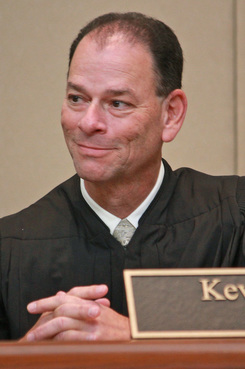Florida Attorney Gets One-Year Suspension for Disparaging Judges
The Florida Supreme Court has said it is "greatly troubled" by the behavior of Hillsborough attorney Kelsay Dayon Patterson in its decision to issue him a yearlong suspension for violating four bar rules. It rejected the court-appointed referee's report as "too lenient."
October 22, 2018 at 12:44 PM
5 minute read
 The Florida Supreme Court under Chief Justice Charles T. Canady. Photo: royalty free.
The Florida Supreme Court under Chief Justice Charles T. Canady. Photo: royalty free.
The Florida Supreme Court has made an example of Hillsborough attorney Kelsay Dayon Patterson, disregarding a court-appointed referee's ”far too lenient” recommendations in favor of more severe punishment over Patterson's ”incendiary and disparaging comments” against judges.
The referee, Pinellas Circuit Judge Pamela A.M. Campbell, found Patterson guilty of professional misconduct — one of four charges brought against him by the Florida Bar — and recommended admonishment and a $2,827.09 fine.
The other three bar violations included conflict of interest, impugning the integrity of judges and engaging in conduct prejudicial to the administration of law.
But the Supreme Court justices found him guilty of all charges, adding that Patterson's “lack of civility” is a problem the court “is striving to curb in the legal profession.” They then suspended him for one year.
“This court is greatly troubled by the general lack of respect and professionalism Patterson displayed toward judges and other professionals,” the court opinion said.
In August 2016, the Florida Bar accused Patterson of acting unprofessionally and pursuing his own interests while representing Johanna Faddis in two civil lawsuits against the City of Homestead, council members and an investigative firm on its payroll.
In November 2012, the circuit court found that Faddis' testimony about the same issue was inconsistent across two different lawsuits, and that Patterson “should have been aware” of that before filing the complaint. Faddis and Patterson were both struck with a final judgment, doling out sanctions and awarding more than $160,000 in attorney's fees to the defendants.
According to the court opinion, this award gave Patterson “a significant financial interest” in the outcome of later appeals, at which point he should have obtained Faddis' informed consent to stay on as her lawyer, but did not.
Read the full court opinion:
The way referee Campbell saw it, a suspension would only exacerbate Patterson's existing financial problems, so she considered a mitigating factor in her decision. She also factored in Patterson's clean disciplinary record and “respectful, humble and professional” attitude toward the proceedings.
In another civil rights claim against the City of Homestead the following year, Patterson sent a letter to federal judge presiding over the case, Jose E. Martinez in the Southern District of Florida, along with various Miami-Dade Circuit and Third DCA judges.
It didn't go well.
In the letter, sent Sept. 20, 2013, Patterson allegedly described what happened in Faddis' circuit court case and outlined his belief that the presiding judge was biased in favor of the opposing counsel.
“We cannot all be judges, politicians, wealthy businessmen or local big named firms with tremendous influence who can supersede all laws on the books,” the letter said.
Patterson labeled this “class of influential citizens” as “elders” and cautioned Martinez against deciding to “elevate” people to a status of “being above the laws they are complicit in, further corroding any remaining sense of justice and fair play left within these elders.”
Click here to read Campbell's full report
 Third DCA Judge Kevin Emas. Photo: J. Albert Diaz/ALM.
Third DCA Judge Kevin Emas. Photo: J. Albert Diaz/ALM.In a later appeal, Patterson wrote in a reply brief, “Law is whatever the judge or judges that day say it is.”
Patterson's letter also mentioned that Third DCA Judge Kevin Emas, who handled Faddis' appeal, was “curiously” pictured with certain “elders” at his investiture ceremony.
Patterson and his attorney, Russell S. Prince of Palma & Prince in Tampa, did not immediately respond to requests for comment. But in his answer to the bar's complaint, Patterson said he'd written “a heartfelt letter to the judge, pointing out all the peculiar and inexplicable rulings that appear to be hurting an otherwise meritorious case.”
Patterson also claimed he'd written the letter based on advice from Judge James Lawrence King Jr. years earlier.
Referee Campbell found that Patterson's decision to send the letter was “flawed,” but that he believed sending it was the right thing to do.
The Florida Supreme Court instructed Patterson to accept no new business and to close out his practice by Nov. 18.
Related stories:
Florida Justices Divided Over South Florida Judge's Removal in Ethics Case
'It's Harsh': Disbarred Florida Lawyer Kelley Andrea Bosecker Speaks Out
Former Broward Judge John Contini Speaks Out After Disbarment: 'Why I Chose Not to Fight'
This content has been archived. It is available through our partners, LexisNexis® and Bloomberg Law.
To view this content, please continue to their sites.
Not a Lexis Subscriber?
Subscribe Now
Not a Bloomberg Law Subscriber?
Subscribe Now
NOT FOR REPRINT
© 2025 ALM Global, LLC, All Rights Reserved. Request academic re-use from www.copyright.com. All other uses, submit a request to [email protected]. For more information visit Asset & Logo Licensing.
You Might Like
View All
Florida Judge Denies Motion to Dismiss in $150M Plane Crash Lawsuit Involving Flow La Movie
3 minute read

Holland & Knight Expands Corporate Practice in Texas With Former Greenberg Traurig Partner
3 minute read
Forum Clause Axes $844M Case Against Reinsurer Over Deadly Plane Crash, Judge Rules
Trending Stories
- 1Judge Pauses Deadline for Federal Workers to Accept Trump Resignation Offer
- 2DeepSeek Isn’t Yet Impacting Legal Tech Development. But That Could Soon Change.
- 3'Landmark' New York Commission Set to Study Overburdened, Under-Resourced Family Courts
- 4Wave of Commercial Real Estate Refinance Could Drown Property Owners
- 5Redeveloping Real Estate After Natural Disasters: Challenges, Strategies and Opportunities
Who Got The Work
J. Brugh Lower of Gibbons has entered an appearance for industrial equipment supplier Devco Corporation in a pending trademark infringement lawsuit. The suit, accusing the defendant of selling knock-off Graco products, was filed Dec. 18 in New Jersey District Court by Rivkin Radler on behalf of Graco Inc. and Graco Minnesota. The case, assigned to U.S. District Judge Zahid N. Quraishi, is 3:24-cv-11294, Graco Inc. et al v. Devco Corporation.
Who Got The Work
Rebecca Maller-Stein and Kent A. Yalowitz of Arnold & Porter Kaye Scholer have entered their appearances for Hanaco Venture Capital and its executives, Lior Prosor and David Frankel, in a pending securities lawsuit. The action, filed on Dec. 24 in New York Southern District Court by Zell, Aron & Co. on behalf of Goldeneye Advisors, accuses the defendants of negligently and fraudulently managing the plaintiff's $1 million investment. The case, assigned to U.S. District Judge Vernon S. Broderick, is 1:24-cv-09918, Goldeneye Advisors, LLC v. Hanaco Venture Capital, Ltd. et al.
Who Got The Work
Attorneys from A&O Shearman has stepped in as defense counsel for Toronto-Dominion Bank and other defendants in a pending securities class action. The suit, filed Dec. 11 in New York Southern District Court by Bleichmar Fonti & Auld, accuses the defendants of concealing the bank's 'pervasive' deficiencies in regards to its compliance with the Bank Secrecy Act and the quality of its anti-money laundering controls. The case, assigned to U.S. District Judge Arun Subramanian, is 1:24-cv-09445, Gonzalez v. The Toronto-Dominion Bank et al.
Who Got The Work
Crown Castle International, a Pennsylvania company providing shared communications infrastructure, has turned to Luke D. Wolf of Gordon Rees Scully Mansukhani to fend off a pending breach-of-contract lawsuit. The court action, filed Nov. 25 in Michigan Eastern District Court by Hooper Hathaway PC on behalf of The Town Residences LLC, accuses Crown Castle of failing to transfer approximately $30,000 in utility payments from T-Mobile in breach of a roof-top lease and assignment agreement. The case, assigned to U.S. District Judge Susan K. Declercq, is 2:24-cv-13131, The Town Residences LLC v. T-Mobile US, Inc. et al.
Who Got The Work
Wilfred P. Coronato and Daniel M. Schwartz of McCarter & English have stepped in as defense counsel to Electrolux Home Products Inc. in a pending product liability lawsuit. The court action, filed Nov. 26 in New York Eastern District Court by Poulos Lopiccolo PC and Nagel Rice LLP on behalf of David Stern, alleges that the defendant's refrigerators’ drawers and shelving repeatedly break and fall apart within months after purchase. The case, assigned to U.S. District Judge Joan M. Azrack, is 2:24-cv-08204, Stern v. Electrolux Home Products, Inc.






